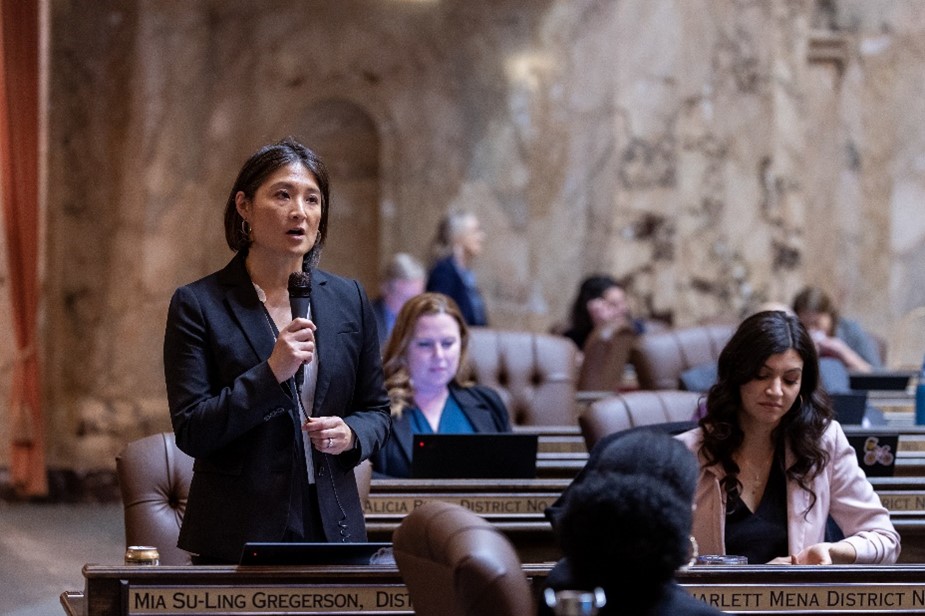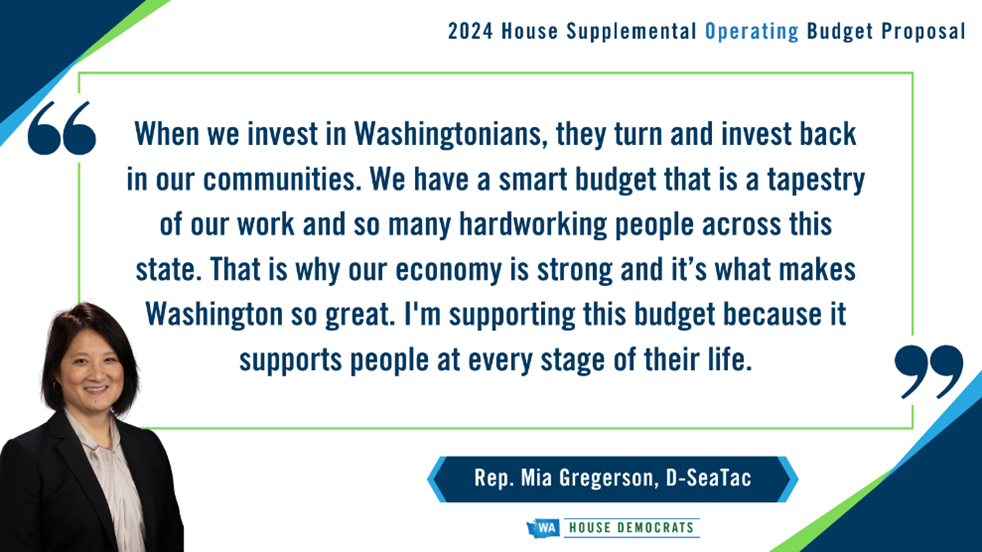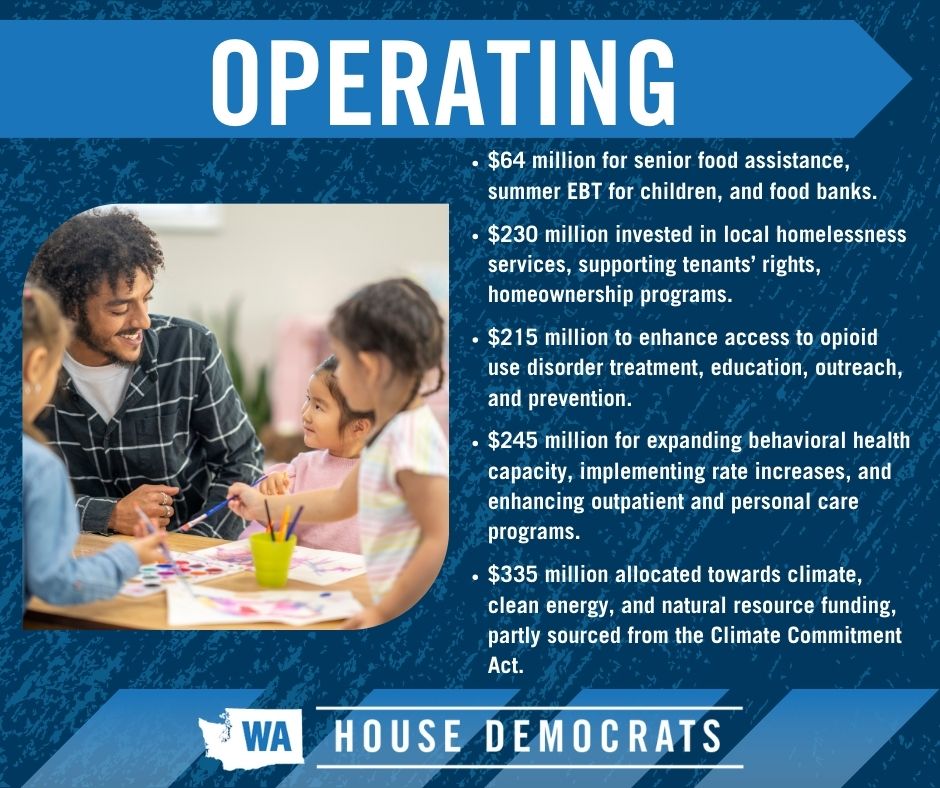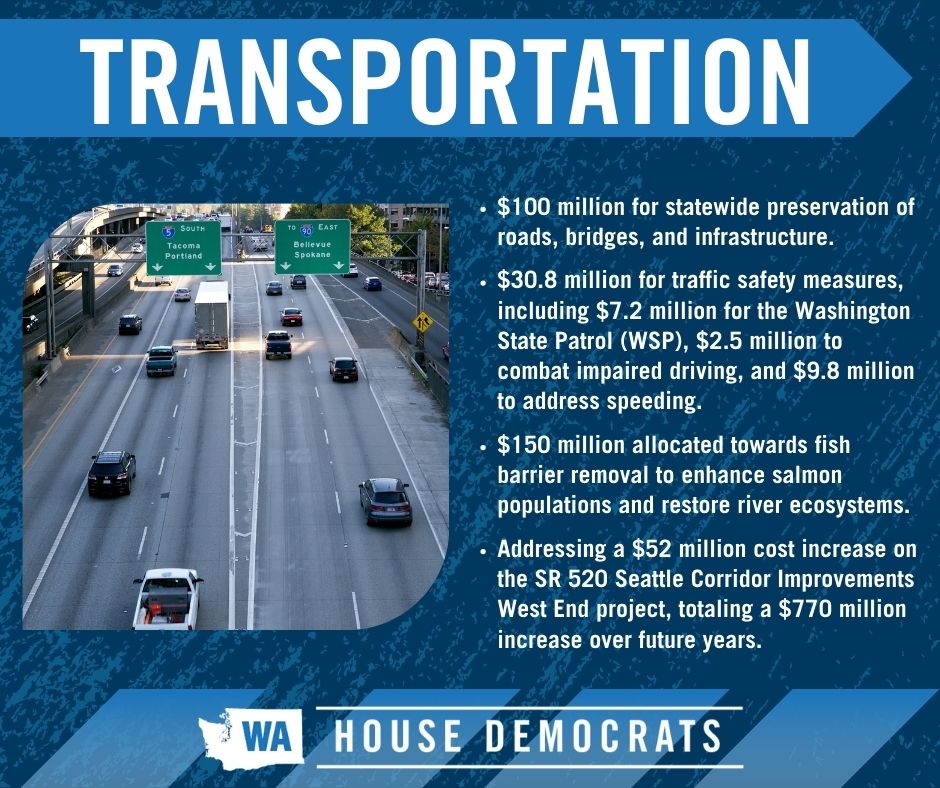Dear friends and neighbors,
The 2024 legislative session adjourned on March 7. After 60-days in session, we have made key progress on issues such as education, housing, economic stability, community safety, and climate change. We also passed three initiatives and three supplemental budgets. Below is an update on our work. I hope you find it useful!

Initiatives To the Legislature
Since 1990, there have been 21 initiatives presented to the legislature. Less than half of these initiatives, specifically 9, have received a hearing. This year, three initiatives received both a hearing and a vote before the legislature: I-2111 concerning state income tax, I-2113 regarding police pursuits, and I-2081 addressing parental rights.
Regarding I-2111, I oppose the income tax initiative because it fails to address the fact that Washington state does not currently have an income tax. Implementing a progressive income tax would require a constitutional amendment. Supporting this initiative perpetuates the false narrative that an income tax affects Washington residents when, in reality, no income tax exists in the state.
As for I-2113, police pursuits pose significant risks to both law enforcement and the public and disproportionately impact communities of color. According to data, in King County, 11.5% of Washington State Patrol initiated stops were of Black drivers despite representing 7% of the population. For Pierce County, 12.7% of Washington State Patrol initiated stops were of Black drivers despite representing 7.7% of the population. That same study found that WSP searched Black drivers at twice the rate of white drivers, and Native American drivers at 5 times the rate of white drivers despite finding contraband less frequently in searches of both Black and Native American drivers.
While I support equipping police with necessary tools, pursuits often result in harm and fatalities. Limiting pursuits, as implemented in 2021, was a response to community concerns about safety. Rather than encouraging dangerous pursuits, we should prioritize alternatives that minimize risk, such as adopting uniform pursuit policies and leveraging innovative technologies like drones.
 Concerning I-2081, the initiative aims to uphold parental involvement in public school education without compromising students’ privacy or rights. It consolidates existing laws and practices without undermining educational opportunities or student privacy rights. However, I remain vigilant about its implementation across Washington, ensuring it doesn’t infringe on any student’s rights or access to reproductive care, especially for LGBTQ+ students. Any overly broad interpretation of this law must be addressed promptly to protect individual rights and privacy.
Concerning I-2081, the initiative aims to uphold parental involvement in public school education without compromising students’ privacy or rights. It consolidates existing laws and practices without undermining educational opportunities or student privacy rights. However, I remain vigilant about its implementation across Washington, ensuring it doesn’t infringe on any student’s rights or access to reproductive care, especially for LGBTQ+ students. Any overly broad interpretation of this law must be addressed promptly to protect individual rights and privacy.
Supplemental Budgets

Operating: Building on economic recovery, the operating budget bolsters existing investments and adds new ones in areas like education, childcare, and affordable housing. It aims to help families across various stages, from students to parents with childcare needs, and young adults pursuing higher education. Additionally, the proposal invests in our shared future, protecting clean air and water, funding childcare with capital gains tax revenue, and ensuring quality long-term care. The budget also includes $1 million in funding from the Climate Commitment Act for noise abatement programs, which is critical in assisting residents affected by airport operations at Sea-tac.

Another area of investment I’d like to highlight is behavioral health funding. This year, inpatient behavioral health capacity will be increased statewide thanks to an additional $230 million investment. Rate increases for long-term civil commitments in the community and behavioral health personal care for those with exceptional needs also saw a combined $60 million investment. To promote reentry, the supplemental budget further invests $25 million into diversion and outpatient care.
I’m also particularly proud of the budgets support for violence prevention and supportive services for victims. The supplemental operating budget includes an additional $12.7 million to support prevention programs aimed at youth and families and direct services and housing supports for victims. Additionally, the legislature made meaningful to address gun violence plaguing our communities. HB 1903, HB 2118, SB 5444, and HB 2021 will ensure safe storage of firearms, prevent thefts and straw purchases from dealers, clarify open carry in certain public locations, and assist law enforcement agencies to destroy guns obtained during buyback events.
Capital: Earlier this week, my colleagues and I finalized this year’s supplemental budgets. The Capital Construction Budget is a spending plan to improve infrastructure and public facilities across the state. This budget prioritizes critical areas like schools, mental health services, and affordable housing. The budget also builds on recent progress in affordable housing with additional funding for the Housing Trust Fund.
One project I was particularly excited to support this year is the HealthPoint program at Tyee High School. Thanks to a $490,000 investment, the recently built Tyee school will be able to provide behavioral health counseling, mobile dental, and clinical support services for students. Care will focus on culturally affirming, holistic, and patient-focused approached to health care and well ness.
The supplemental capital budget further includes $14.55 million for modernization of the recently acquired Olympic Heritage Behavioral Health facility which provides 137 beds to serve people in state psychiatric care. An additional $30 million is provided for the purchase and construction of a new facility. Together, this investment will help Washington meet its obligation in providing competency restoration and state mental health services.
Another particularly meaningful project for our community is the Kent Multicultural Village, which received $5 million from the supplemental budget. This funding will move our community one step closer toward the establishment of a 262,000 square foot mixed-use building to provide supportive housing and services to BIPOC people and families with intellectual and developmental disabilities. By providing multi-generational, affordable, and inclusive mixed-use housing project, we can better rectify an exclusionary past that has isolated communities from equitable access to critical public services.
Transportation: The supplemental transportation budge tackles infrastructure needs, ferry upgrades, and rising traffic fatalities. Federal funds, Climate Commitment Act auctions, and existing programs fueled the rise, aiming to handle construction costs, maintain aging infrastructure, and improve safety. For example, the Puget Sound Gateway project will proceed as planned thanks to a $795 million investment in the 2023-2025 transportation budget.
Additionally, infrastructure gains priority with bridge replacements, fish passage repairs, and highway maintenance funding. Ferries receive a $207 million allocation for construction, maintenance, and workforce development, including funding for new hybrid-electric models and terminal electrification.

Climate action gets a boost, specifically targeting underserved and tribal communities, while funding clean transportation initiatives like school district fleet electrification efforts. Recognizing the 2023 traffic fatality spike, the budget allocates funds for traffic management, law enforcement, and infrastructure improvements. Speed camera considerations for construction zones and cities are also underway. This budget reflects the state’s commitment to tackling transportation challenges, promoting clean options, and ensuring a safer road ahead.
Addressing Hate Crimes & Bias Incidents
Washington is fighting hate with a new hotline! Senate Bill 5427 offers a safe space for victims of hate crimes and bias incidents through a non-police hotline, run by the Attorney General’s Office. This hotline provides confidential support, crisis intervention, and culturally sensitive help. It connects victims with local resources too.
This is crucial because many incidents go unreported due to fear or lack of trust in traditional channels. The hotline won’t replace law enforcement and focuses on non-criminal bias, not stifling free speech. This is a big step towards a more inclusive Washington. Read more in this recent Seattle Times article.
Meeting With You

The 33rd district is fortunate to be one of the most geographically beautiful areas in our state. Within it, our neighbors and friends also compose one of the most diverse districts in the state. This diversity has helped me learn more about a wider range of issues and driven me to advocate for legislation in numerous policy areas.
To learn more about the work achieved during the 2023 and 2024 legislative sessions and to continue sharing issues that matter most to you, please consider emailing, calling, or scheduling a meeting with me. You can also stay up to date on my work on Facebook and my website.
Best wishes,

Representative Mia Gregerson
33rd Legislative District
